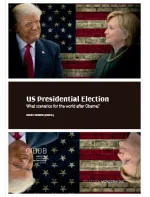Obama and the Iran Nuclear Deal

It is more than likely that Barack Obama will be missed whatever the outcome of the imminent presidential elections. Definitely, if the shameless bully Trump is elected, but also in the case that Hillary Clinton becomes the next president of the United States. It is true that, compared with the hopes and enthusiasm that his first election to the White House unleashed, his tenure as president has been marked by a lot of disappointment, and yet he will be remembered for his commitment to more justice as well as his awareness of the limits of American power.
But what about concrete achievements? One could focus especially on two: internally, the health reform, giving coverage to millions of citizens who had previously been left to fend for themselves in a situation of forbidding health costs; internationally, the Iranian nuclear deal.
Now that an agreement has been reached with the 2015 JCPOA (Joint Comprehensive Plan of Action), it is difficult to fully appreciate the huge difficulties that had to be overcome in order to reach that goal. Not so much technical difficulties – though it did indeed take a lot of highly professional work in order to define all the complex details – but rather political difficulties. If one focuses on what Iran’s positions were during the Khatami years (i.e. until 2005, when Ahmadinejad was elected) it is very clear that the main stumbling block was the fact that the US was not willing to admit that Iran had the same rights, as far as the enrichment of uranium was concerned, as any other country. Washington (and, following Washington, the Europeans) continued for years sticking to a dogma: zero enrichment. Since the Iranians were not budging on that point (unacceptable for all Iranians: the nuclear issue has always been perceived as a national, not a regime issue) tensions were high, and Washington continued repeating, very ominously, that all options were on the table, meaning that a military attack against Iran was possible and conceivable. The reasons for this uncompromising hostility toward the idea of treating Iran as a “normal country” were several: there was the historical trauma of the hostage crisis, but the most of all was the pressure of Washington’s allies (Israel and Saudi Arabia, very much aligned), who were bent on keeping Tehran in a corner if not achieving regime change. The goal of nonproliferation is a serious one, especially in the Middle East, although the glaring “Israeli exception” (Israel has an undeclared but wellknown nuclear arsenal) renders it lopsided and scarcely credible.
It should be added parenthetically that the whole discourse on nonproliferation is indeed highly problematic, and not only in relation to the Iranian question. The problem is that the Non-Proliferation Treaty – NPT – is being applied in a highly unbalanced way, in the sense that the nuclear powers behave as if its only purpose is to prevent the accession of new members to the nuclear club, whereas that is only one of the three aspects of the treaty. The others are peaceful nuclear cooperation (which Iran has in vain tried to obtain from the West, being forced to accept Russian cooperation as second best) and, in particular, disarmament. The NPT has been applied as if it was designed to freeze the difference between the nuclear “haves” and the nuclear “have nots”, forgetting that the countries who have nuclear military capacity should embark on gradual nuclear disarmament. No sign of that: nuclear countries (from Russia to the US to the UK) are now starting major modernisation programmes.
The Iranian nuclear issue has not only been about international rules, but also about strategic realities. The very fact that Israel could attack Iran with scores of nuclear warheads makes the prospect of a nucleararmed Iran attacking Israel less than credible, given its evidently suicidal outcome.
The nuclear issue was instrumental for both sides: Washington (in particular the US Congress), Israel and the Gulf countries, headed by Saudi Arabia, intended to use it to prevent Iran from leaving its condition of isolation, both economic and diplomatic, whereas Tehran was defending the right to a non-discriminatory set of rules, but was also using the nuclear issue to obtain the recognition of Washington as a direct interlocutor. It is significant that when Foreign Minister Zarif returned to Iran after the signing of the JCPOA he was greeted at Tehran airport by an enthusiastic crowd chanting: “Zarif, you are the new Mossadeq” (alluding to the prime minister who nationalised the oil industry in 1951) – thus confirming the nationalist essence of Iran’s policy.
Reaching an agreement required a lot of effort on both sides: a new president in Iran, Rohani (a centrist rather than a reformist), and another centrist, Obama, in Washington, and first-class diplomatic skills on the part of Secretary of State Kerry and Foreign Minister Zarif.
Will the agreement stand after Obama leaves the White House?
A lot of people hope it will not: in the US Congress initiatives to sabotage the JCPOA started cropping up soon after the agreement was concluded. Israel and the Saudis have never reconciled themselves to the idea that Iran could have a regional role as a normal player within a realist framework of containment/dialogue. The hardliners in Tehran have been pointing out that the economic benefits of the agreements have been few and are using this widespread disappointment to weaken Rohani, hoping that he can be defeated in next year’s presidential elections.
Perhaps the agreement will be maintained in its basic contents, but –with the end of Obama’s presidency – it is quite foreseeable that things will become more difficult and more tense, with the danger that another crisis will be added to the already dismal Middle Eastern situation.